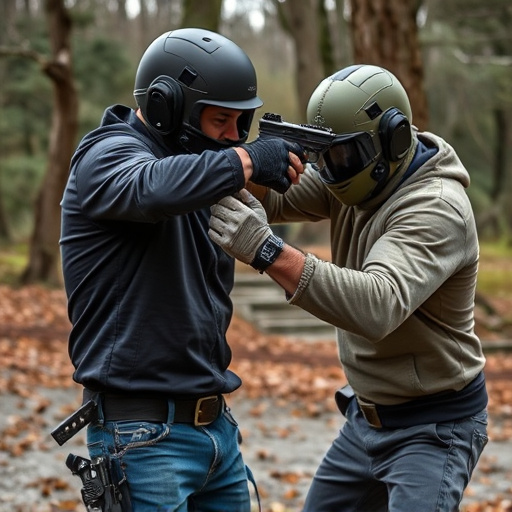Environmental conditions, including humidity, temperature, wind, and rainfall, significantly alter pepper spray effectiveness. High humidity dilutes capsaicin, while extreme cold can cause freezing and loss of potency. Strong winds carry spray away, while calm air improves concentration. Understanding these factors is crucial for optimal deployment strategies in personal security.
Personal security is a top concern, and pepper spray has long been a reliable defense tool. However, its effectiveness can be significantly influenced by environmental conditions. This article delves into crucial aspects of these factors, including weather, temperature, and humidity, that impact the performance of pepper spray. By understanding how environmental conditions affect your protection, you can make informed decisions to ensure maximum safety in various settings.
- Environmental Factors Impacting Pepper Spray Efficacy
- Understanding Weather Conditions and Personal Safety
- The Role of Temperature in Pepper Spray Performance
- Exploring Humidity's Effect on Pepper Spray Protection
Environmental Factors Impacting Pepper Spray Efficacy
The effectiveness of pepper spray, a popular personal security inflammatory defense product, can be influenced by various environmental factors. Weather conditions play a significant role; for instance, high humidity levels can reduce its potency as water dilutes the capsaicin, the active ingredient responsible for the burning sensation. Conversely, extreme cold temperatures may cause the spray to freeze and solidify, making it less effective in self-defense scenarios.
Additionally, wind direction and speed are critical variables. Strong winds can carry the pepper spray away from the intended target, reducing its impact range and intensity. On the other hand, calm or still air conditions allow for better concentration of the spray, ensuring a more direct and potent effect. These environmental considerations are crucial in understanding the optimal deployment strategies for pepper spray as a personal defense mechanism.
Understanding Weather Conditions and Personal Safety
Understanding weather conditions is a crucial aspect of personal security, especially when considering inflammatory defense products like pepper spray. Environmental factors can significantly impact its effectiveness and your safety. For instance, heavy rainfall or strong winds might reduce the spray’s range and concentration, making it less potent against attackers. Conversely, hot and humid climates can cause pepper spray to evaporate faster, requiring more frequent applications.
Knowing these environmental conditions allows users to make informed decisions about when and how to deploy their defense tools. In adverse weather, consider using longer-range options or those designed for specific challenges, such as water-resistant formulations. Being prepared for various scenarios ensures that you’re in control of your safety, no matter the atmospheric conditions.
The Role of Temperature in Pepper Spray Performance
The performance of pepper spray is heavily influenced by environmental conditions, particularly temperature. In general, pepper spray becomes more effective as temperature increases. This is because capsaicin, the active ingredient in pepper spray, has a lower melting point than water. As the temperature rises, the spray’s concentration and potency increase, allowing for better penetration and irritation of the target’s eyes and respiratory system.
However, extreme temperatures can also affect the spray’s reliability. High heat can cause the spray to evaporate too quickly, reducing its range and intensity. Conversely, very cold temperatures can solidify the pepper spray solution, making it less effective when deployed. Therefore, optimal performance is typically achieved within a moderate temperature range, ensuring that the capsaicin remains in a liquid state while maintaining its potent irritant properties.
Exploring Humidity's Effect on Pepper Spray Protection
The effectiveness of pepper spray protection can be influenced by various environmental conditions, with humidity being a significant factor. In humid environments, pepper spray may lose its potency as moisture in the air can dilute the active ingredients. This is because pepper spray relies on a fine mist to deliver capsaicin, the active compound responsible for the burning sensation it causes. High humidity levels can cause the mist to evaporate more quickly, reducing its impact on potential attackers.
Additionally, when the air is moist, the spray particles might not adhere as well to the eyes and skin of the target, leading to a less effective irritation response. This is particularly relevant in regions with high atmospheric moisture or for individuals using pepper spray in humid climates. Understanding how humidity affects pepper spray performance is crucial for users to make informed decisions about when and where to deploy such self-defense tools, ensuring their effectiveness under different environmental conditions.
In conclusion, understanding the environmental conditions affecting pepper spray is paramount for ensuring personal security. Factors like temperature and humidity play significant roles in its efficacy, impacting how well it protects against potential threats. By being aware of these influences, individuals can make informed decisions regarding their safety and choose the most suitable defense strategies for different environments. Navigating these challenges equips folks with the knowledge to safeguard themselves effectively in various weather conditions.
